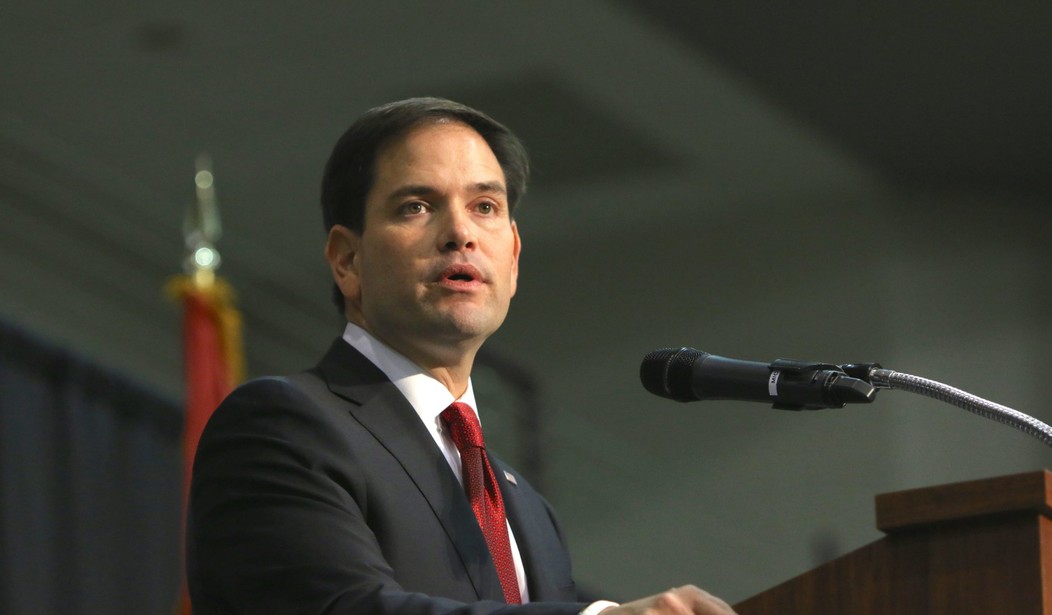Donald Trump is not the favorite to win the Republican primary in 2016. National polls can be misleading — there is no day or time when Republicans across the nation will pick their presidential candidate. Instead, there will be multiple elections in all 50 states, on multiple days, and some states will matter more than others. This explains why so many pundits have predicted a Cruz-Rubio race.
In order to make this contest easier to understand, RealClearPolitics authors Sean Trende and David Byler created an interactive tool called the GOP Race for Delegates (you can find it here). Any reader can enter the polling results from each state’s primary and see how these results would affect the overall outcome. For convenience, Trende and Byler integrated each state’s rules into the program, and loaded the RealClearPolitics polling averages for the early states as a guideline.
Using this tool, Trende and Byler discovered many important features of the Republican primary to come. While conservative southern states will likely winnow the field, more liberal northern states will play a huge role in actually determining who will become the nominee. Some traditional wisdom is proven false, and there is a strong likelihood of a final battle between Senators Ted Cruz (TX) and Marco Rubio (FL).
Cruz-Rubio
While Trende and Byler emphasize that “there are an almost infinite number of possibilities,” they did tend to find one much-discussed outcome kept showing up in their simulations — a struggle between Ted Cruz and Marco Rubio.
The situation plays out in this way: The four early primary states — Iowa, New Hampshire, South Carolina, and Nevada — end up supporting Cruz, Trump, and Ben Carson, leaving Marco Rubio as the only remaining viable establishment candidate.
Then comes the SEC primary — where a large chunk of southern (usually conservative) states give Ted Cruz a huge bump. Texas (with its 155 delegates) goes to Cruz, making him the effective conservative candidate. A large majority (70 percent) of Texas’ delegates will be decided on March 1st, and will be awarded with a winner-take-all situation by congressional district. If Cruz gains a majority in most congressional districts, he will take a serious lead from this state alone. This leads Trump and Carson to withdraw or become less relevant.
Finally, the later, northern (and more liberal) states, which are more likely to be the winner-take-all (giving the primary winner all the delegates rather than dividing up delegates according to percentages), break for Rubio. This turns into a “barnburner of a race,” where Rubio likely wins, but Cruz becomes the clear runner-up.
Southern States Winnow, Northern States Decide
There are fundamental reasons behind this outcome. The presidential primary race is an obstacle course, where each state presents challenges and advantages to each candidate.
Southern states have earlier primaries, but they split up their delegates by the candidate’s percentage of the vote (so even if Donald Trump won Alabama, for example, with 30% of the vote, he would only get 30% of the delegates). Northern states have later primaries, but tend to be winner-take-all, allowing one candidate to win all their delegates.
This creates a very interesting breakdown between conservative and liberal states. Conservative states decide first, but do not yield large delegate counts for their candidates. This means that conservatives will decide who wins and loses early on, and early wins and losses usually winnow the field — encouraging losers to drop out and endorse the winners.
On the flip side, however, liberal states have a disproportionate influence in the later stages of the primary. Being winner-take-all, they award a winning candidate large amounts of delegates. To win the nomination, 1,236 delegates are needed. It is possible for a liberal candidate who stays in the race until the later stages to suddenly rack up large support from delegates.
The influence of northern states explains why the Republican Party has tended to nominate presidential candidates with a more establishment bend, like John McCain in 2008 and Mitt Romney in 2012.
The northern state influence also explains why Mike Murphy told Bloomberg Politics that it would be possible for a candidate who failed to win a single state to become the delegate leader in March. Trende and Byler predicted that some establishment candidates might fight on through the early states in hopes of posting big wins in the later stages of the primary.
Failings of Conventional Wisdom
Trende and Byler have bad news for political junkies who think only Democrats have “superdelegates” and that a “backdoor winner-take-all” strategy can propel a candidate to victory.
The Democratic Party has “superdelegates,” party officials who are unpledged to any candidate and can give their support to whichever candidate they decide. Contrary to conventional wisdom, the Republican Party has its own version of these unpledged delegates — “RNC delegates” — who are party officials with automatic credentials to the convention.
While these free radicals may give an establishment candidate a leg up, “RNC delegates” would face tremendous pressure to support even an insurgent candidate if he or she won the delegate county and the popular vote. This pressure helped Barack Obama win the nomination in 2008, despite the Democratic “superdelegate” support for Hillary Clinton.
Some have theorized that a candidate can win the nomination through “backdoor winner-take-all.” Many states have minimum thresholds for allocating delegates, usually around 20 percent. If only the winning candidate wins upwards of 20 percent, then only that candidate can technically claim the state’s delegates. In a crowded field, it is quite possible that only one candidate would win that 20 percent, taking all the delegates.
In practice, however, this strategy will not work. Most states have realized this loophole, and adjusted their laws accordingly. Their laws now grant delegates to the top two vote getters, regardless of the cutoff.
“The Party Decides”
Another piece of conventional wisdom has yet to be tested. “The Party Decides” hypothesis claims that party officials (broadly defined) play a huge role in primaries and often succeed in bringing chaotic contests to an orderly close.
The recent race for speaker of the House may be the best illustration of this. When John Boehner announced his resignation, his would-be successor Kevin McCarthy failed to draw enough support to take his place, throwing the Republican Party into much-exaggerated chaos. As party officials discussed the issue, however, it became clear that one candidate, Paul Ryan, would unite the party. When Ryan decided to run, the race was over.
In a similar vein, the party may coalesce behind one candidate, especially if Donald Trump continues to scare the establishment. The story of a “divided Republican Party backing Donald Trump” may sell newspapers, but the odds of it being true are slim.
Many argue that this time might be different. Strong insurgent candidates, the rise of Internet fundraising, and the hypothetical ability of super PACs to keep candidates going (this was not the case for Rick Perry, whose super PAC was flush even as his campaign went broke) may combine to make this primary unusually bloody, long, and indecisive.
Some have argued that this race will end in a brokered convention — with no candidate a clear winner at the Republican National Convention in Cleveland, Ohio. In that case, delegates at the convention would vote — again and again, if necessary — to finally determine who is the nominee.
One thing is for certain — Republicans are in for quite a show. Whether the Cruz-Rubio race ensues, Trump keeps his lead, or the GOP faces a brokered convention in Cleveland, the primary should be a wonderful spectacle, especially compared to the old folks’ table across the aisle. Go grab the popcorn, and cast your ballots wisely!









Join the conversation as a VIP Member